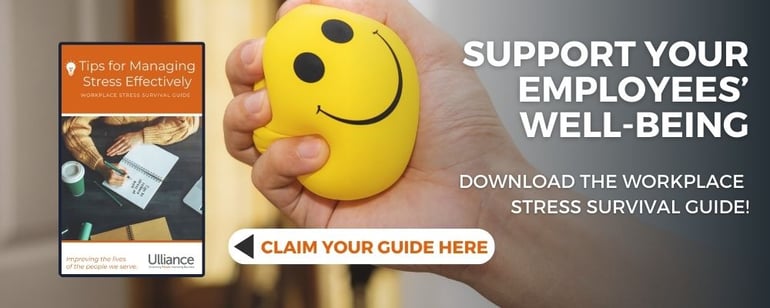It's estimated that 1 in every 5 adults in the United States experiences some form of mental illness in a given year. This could range from anxiety and depression to more severe conditions like bipolar disorder or schizophrenia.
The World Health Organization estimates that "15% of working-age adults have a mental disorder at any time."
Mental health challenges can have a significant impact on an individual's daily life, making it difficult for them to function and enjoy their usual activities. This is where an employee assistance program can help. Mental health counselors can play a crucial role in helping individuals cope with their challenges.
Why Mental Health Counseling Matters
Whether you're an employee navigating your own mental health challenges or an HR professional tasked with supporting the well-being of your workforce, understanding the role that mental health counseling can play is crucial.
Mental health counselors can serve as valuable resources, offering confidential, non-judgmental support and helping individuals develop effective coping strategies. These trained EAP professionals can also provide specific guidance on workplace-related issues:
- EAP counselors can equip employees with techniques to manage demanding workloads and tight deadlines.
- EAP counselors can help employees develop communication skills to navigate difficult conversations and foster stronger relationships with colleagues.
- EAP counselors can foster a more inclusive and supportive work environment by offering guidance on creating a culture of inclusion and respect.

For Employees: How an EAP Counselor Can Help
Making the decision to seek help for mental health concerns can be daunting. However, if your company offers counseling services, it's a valuable resource that can equip you with the tools and strategies to navigate challenges and improve your overall well-being.
5 Ways aN EAP Counselor can support you in tackling these issues:
1.unveiling the root causes
An EAP counselor acts as your guide, facilitating a deep exploration of your personal history, behaviors, and thought patterns. This in-depth analysis can uncover the root of your challenges, helping you understand long-held emotions or unresolved experiences that might be impacting your current mental well-being.
2.developing a toolkit for success
Counseling isn't just about understanding the "why"; it's also about equipping you with the "how." Your counselor will work with you to develop personalized coping strategies that empower you to manage stress and difficult emotions effectively. These strategies can become your toolkit for navigating challenges at work, at home, and in any area of your life.
3.The Power of a safe space
Sometimes, simply having a safe space to express your emotions and thoughts without judgment can be incredibly therapeutic. A counselor provides that space, allowing you to openly discuss concerns you might not feel comfortable sharing with friends or colleagues. This sense of confidentiality is crucial in fostering trust and creating an environment where you can truly be yourself.
4.Tailored support for the workplace
The workplace can be a source of stress for many people. Counselors can offer specific guidance on how to manage these pressures. They can help you with skills like effective communication with colleagues, setting boundaries to maintain a healthy work-life balance and navigating challenging workplace dynamics.
5.Investing in self-care
Prioritizing self-care is essential for maintaining good mental health. A counselor can help you create a personalized self-care plan that aligns with your specific needs and goals. This plan might include activities like exercise, relaxation techniques, or healthy sleep habits, all of which contribute to your overall well-being.
Seeking help from a counselor isn't a sign of weakness; it's a sign of strength and a proactive step toward prioritizing your mental health. By investing in yourself and acquiring the right tools and support, you can overcome challenges, improve your overall well-being, and thrive in both your personal and professional life.
For Companies: Benefits of Integrating EAP Counseling Services
Numerous studies have highlighted the positive impact that providing access to mental health counseling can have on both employee well-being and organizational performance.
More than 80% of employees who receive treatment for mental illness report improved levels of work satisfaction and efficacy.
Workplace Mental Health
5 key benefits:
1.improved employee well-being
By addressing mental health concerns, employees can experience reduced stress, anxiety, and depression, leading to a greater sense of well-being and overall happiness. Counseling can also improve sleep quality, boost self-esteem, and increase resilience in the face of adversity.
2. productivity
Employees who receive counseling have reported increased job satisfaction and motivation. By addressing underlying mental health concerns, employees can experience improved concentration, better decision-making abilities, and increased overall productivity.
3. positive impact on company culture
Integrating EAP counseling services can help promote a culture of open communication and support for employee well-being. Counselors can also assist in identifying workplace stressors and provide guidance on how to manage them effectively. Providing counseling services demonstrates an investment in employee well-being and can boost morale and loyalty among the workforce.
4. reduced absenteeism
By addressing mental health concerns proactively, organizations can experience a decrease in employee absenteeism. Counseling can help employees cope with personal issues that may affect their ability to show up to work, such as family problems or stress-related illnesses.
5. lower healthcare costs
Early intervention and support for mental health concerns can lead to lower healthcare costs for the organization. By addressing mental health concerns, individuals may require less time off work due to illness and have fewer hospital visits, resulting in cost savings for both the employee and the employer.
Implementing a Mental Health Program
Implementing a comprehensive mental health program within the workplace is crucial for cultivating a supportive and productive environment. Employee Assistance Programs (EAPs) can be helpful in developing strategies organizations can adopt to address mental health needs.
assessment and Planning
Start by assessing the mental health climate of your organization through anonymous surveys or focus groups. This step is about identifying key stressors and mental health challenges faced by employees. Use this data to design targeted interventions that address these specific issues.
policy development
Develop clear policies that support mental health. This might include flexible working arrangements, mental health days, and guidelines for managers on how to support employees experiencing mental health challenges. Policies should be designed to promote well-being and provide support for those in need.
training and awareness programs
Conduct training sessions for all employees, focusing on mental health awareness, stress management techniques, and fostering a supportive work environment. For managers, offer additional training that equips them to recognize signs of distress among team members and to respond appropriately, respecting confidentiality and privacy.
Promotion of EAP SErvices
To increase awareness of your employee assistance program, consider implementing various strategies. A warm welcome letter or introduction can establish the right tone. At Ulliance, we employ a range of methods to showcase EAP services monthly, focusing on different mental health topics. At the close of each month, promotional materials, including posters, newsletters, custom explainer videos, and webinars, are sent to the HR Manager for distribution. This ensures that the program remains at the forefront of employees' minds.
creating support structures
Establish internal support structures, such as peer support networks or wellness committees, to provide ongoing support to employees. These structures can offer a first line of support and guidance, helping to foster a community where employees feel valued and supported.
promoting work-life balance
Encourage practices that promote a healthy work-life balance. This could involve setting clear expectations around working hours, encouraging regular breaks, and facilitating discussions around workload management. The goal is to create an environment where employees feel their well-being is a priority.
accessibility to mental health resources
While an EAP can be a valuable resource, ensure that employees have access to a variety of mental health resources. This could include a curated list of local therapists and mental health services, online self-help tools, and information about national mental health organizations.
monitoring and Continual Improvement
Regularly evaluate the effectiveness of your mental health initiatives through feedback surveys and focus groups. Use this feedback to refine and expand your programs. Stay informed about new mental health practices and interventions that could benefit your organization.
fostering an open culture
Work to create an organizational culture where mental health is openly discussed and supported. Encourage leadership to speak openly about the importance of mental health, share their own experiences, and destigmatize seeking help.
Healthy Employees and a Thriving Workforce
In today's often challenging and rapidly evolving world, addressing mental health concerns is a critical priority.
Individuals who are experiencing mental health challenges should know that seeking support is a sign of strength, rather than weakness. Mental health counselors can help not only to identify the issues but also to work toward productive solutions.
Organizations can promote a healthier and more productive workforce by offering mental health counseling services. In turn, this can lead to increased employee satisfaction, reduced absenteeism, improved company culture, and cost savings for the organization.
When you partner with Ulliance, our Life Advisor Consultants are always just a phone call away to teach ways to enhance your work/life balance and increase your happiness. The Ulliance Life Advisor Employee Assistance Program can help employees and employers come closer to a state of total well-being.
Investing in the right EAP or Wellness Program to support your employees will help them and help you. Visit https://ulliance.com/ or call 866-648-8326.
The Ulliance Employee Assistance Program can address the
following issues:
• Stress about work or job performance
• Crisis in the workplace
• Conflict resolution at work or in one’s personal life
• Marital or relationship problems
• Child or elder care concerns
• Financial worries
• Mental health problems
• Alcohol/substance abuse
• Grief
• Interpersonal conflicts
• AND MORE!
Have some questions about our services? Book a quick meeting below!
References:
5 Benefits of Working With a Mental Health Counselor; Avila University; Darren Roubinek, https://www.avila.edu/2022/12/13/5-benefits-of-working-with-a-mental-health-counselor/
Making the Business Case; Center for Workplace Mental Health
https://workplacementalhealth.org/making-the-business-case
Mental Health In The Workplace: Centers for Disease Control & Prevention
https://www.cdc.gov/workplacehealthpromotion/tools-resources/workplace-health/mental-health/index.html
What Is a Mental Health Counselor? Plus Where You Can Find One; Healthline, https://www.healthline.com/health/mental-health/mental-health-counselors

